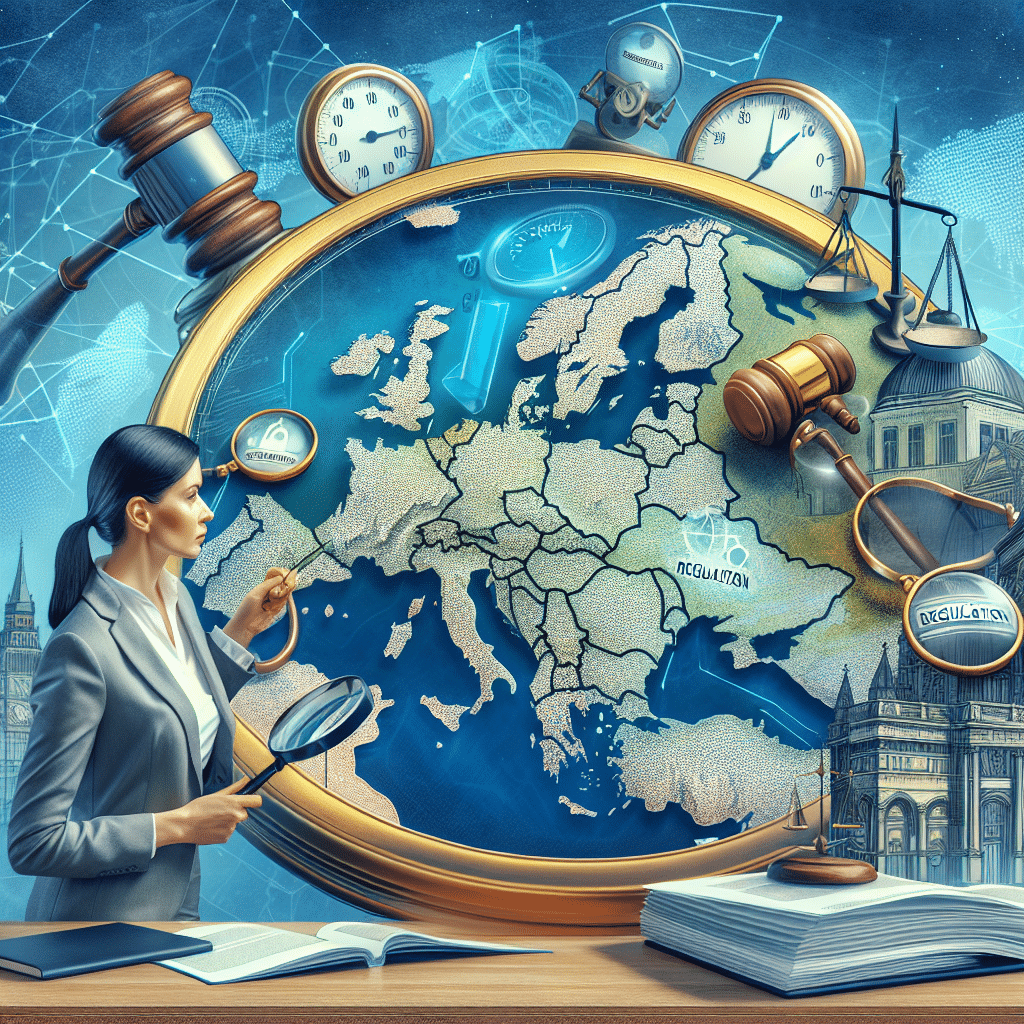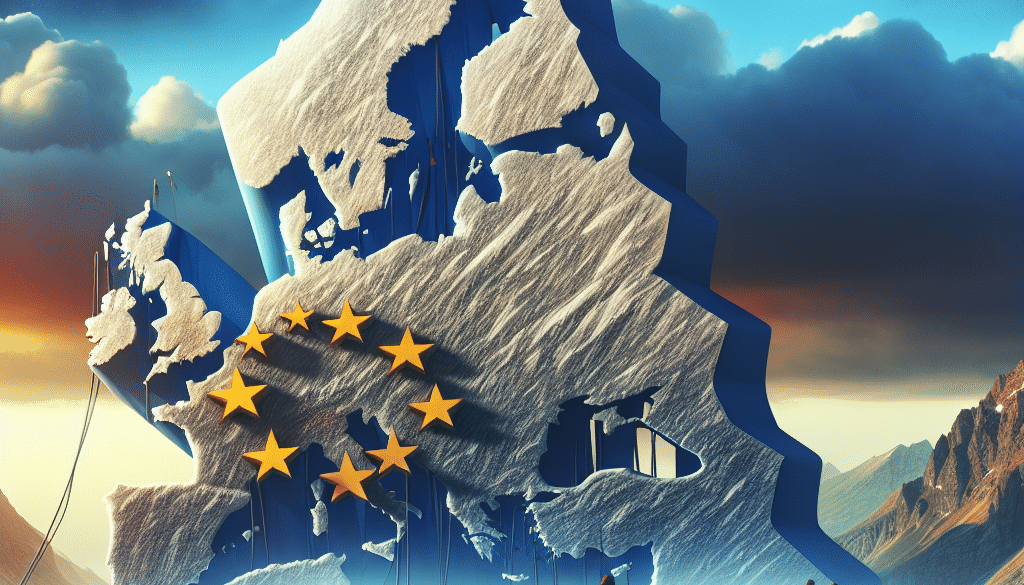Regulatory Readiness: Preparing for Europe’s Imminent Changes
-
Table of Contents
- Europe’s Regulatory Landscape: Navigating Upcoming Changes
- Understanding the Regulatory Shifts in Europe
- Strategies for Achieving Regulatory Readiness
- Conduct a Regulatory Impact Assessment
- Engage with Regulatory Bodies
- Invest in Compliance Infrastructure
- Train Your Workforce
- Monitor Regulatory Developments
- Case Studies: Successes in Regulatory Adaptation
- Preparing for Specific Regulatory Changes
- Data Protection and Privacy Enhancements
- Adapting to the European Green Deal
- Navigating the Digital Services Act and Digital Markets Act
- Complying with Evolving REACH Regulations
- Conclusion: Embracing Regulatory Changes as Opportunities
- ETprotein: Your Partner in Regulatory Readiness
Europe’s Regulatory Landscape: Navigating Upcoming Changes

Europe’s regulatory environment is undergoing significant transformations, with new policies and regulations set to impact a wide range of industries. Companies operating within the European Union (EU) and those planning to enter the market must stay informed and agile to remain compliant and competitive. This article delves into the imminent regulatory changes in Europe, offering insights and strategies for businesses to ensure regulatory readiness.
Understanding the Regulatory Shifts in Europe
The EU is known for its robust regulatory framework, which is continuously evolving to address new challenges and promote innovation, consumer protection, and environmental sustainability. Several key areas are currently under the spotlight, with new regulations poised to take effect in the near future.
- Data Protection and Privacy: The General Data Protection Regulation (GDPR) set a global standard for data privacy, and further enhancements are expected to address emerging technologies.
- Environmental Regulations: The European Green Deal aims to make the EU climate-neutral by 2050, leading to stricter regulations on emissions, waste management, and sustainability reporting.
- Digital Markets: The Digital Services Act (DSA) and Digital Markets Act (DMA) are set to reshape the digital economy, targeting large tech companies to ensure fair competition and consumer rights.
- Chemical Safety: The Registration, Evaluation, Authorisation and Restriction of Chemicals (REACH) regulation continues to evolve, with new substances being assessed and controlled.
Strategies for Achieving Regulatory Readiness
Staying ahead of regulatory changes requires a proactive approach. Companies must implement strategies that not only ensure compliance but also leverage these changes as a competitive advantage.
Conduct a Regulatory Impact Assessment
Begin by assessing how upcoming regulations will affect your business operations. Identify areas of risk and opportunity, and develop a plan to address them. This may involve revising internal policies, investing in new technologies, or retraining staff.
Engage with Regulatory Bodies
Active engagement with regulators can provide early insights into regulatory developments. Participate in consultations, workshops, and industry groups to influence policy-making and gain a deeper understanding of the regulatory landscape.
Invest in Compliance Infrastructure
Robust compliance systems are essential for managing complex regulations. Invest in technology solutions that can handle data management, reporting, and compliance monitoring to streamline processes and reduce the risk of non-compliance.
Train Your Workforce
Ensure that your employees are well-informed about regulatory changes and their implications. Regular training sessions can help build a culture of compliance and empower staff to identify and address compliance-related issues.
Monitor Regulatory Developments
Regulatory landscapes are dynamic, and businesses must stay informed about changes. Establish a monitoring system to track regulatory updates and analyze their potential impact on your operations.
Case Studies: Successes in Regulatory Adaptation
Several companies have successfully navigated regulatory changes in Europe by adopting proactive strategies. For instance, a major pharmaceutical company overhauled its data management systems in response to GDPR, not only achieving compliance but also improving customer trust and operational efficiency. Another example is an automotive manufacturer that embraced the EU’s emissions standards, investing in electric vehicle technology and gaining a competitive edge in the market.
Preparing for Specific Regulatory Changes
Let’s delve deeper into some of the specific regulatory changes and how businesses can prepare for them:
Data Protection and Privacy Enhancements
With the GDPR as a foundation, businesses should be ready to handle stricter consent requirements, enhanced rights for individuals, and potential limitations on data transfers outside the EU. Companies should review their data protection policies and ensure they have robust cybersecurity measures in place.
Adapting to the European Green Deal
Businesses must evaluate their environmental footprint and develop strategies to reduce emissions, improve energy efficiency, and transition to sustainable practices. This may involve investing in renewable energy, redesigning products for circularity, and enhancing supply chain sustainability.
Navigating the Digital Services Act and Digital Markets Act
Companies in the digital sector should assess how the DSA and DMA will affect their operations. This may require changes to online platforms, increased transparency in algorithms, and measures to ensure fair competition.
Complying with Evolving REACH Regulations
Companies dealing with chemicals should stay abreast of the substances being evaluated under REACH. They must be prepared to substitute hazardous chemicals with safer alternatives and comply with new reporting requirements.
Conclusion: Embracing Regulatory Changes as Opportunities
Regulatory readiness is not just about compliance; it’s about turning regulatory changes into opportunities for innovation, growth, and competitive differentiation. By understanding the regulatory shifts, implementing strategic plans, and staying informed, businesses can navigate Europe’s evolving regulatory landscape with confidence.
ETprotein: Your Partner in Regulatory Readiness
As businesses prepare for Europe’s imminent regulatory changes, partnering with companies like ETprotein can provide a competitive edge. ETprotein’s range of high-quality protein products, including organic and allergen-free options, can help companies meet stringent regulatory standards while catering to the growing demand for sustainable and health-conscious products.
ETprotein’s commitment to non-GMO, organic ingredients aligns with the European Green Deal’s sustainability goals, making their products an excellent choice for businesses looking to enhance their environmental credentials. Moreover, their adherence to high-quality standards ensures that companies can rely on ETprotein for products that meet the rigorous demands of the European market.
Whether you’re in the food and beverage industry, sports nutrition, or health and wellness, ETprotein’s diverse product range can support your regulatory readiness efforts. By choosing ETprotein, you can ensure that your products not only comply with current regulations but are also well-positioned to adapt to future changes.
About ETprotein:
ETprotein, a reputable protein and L-(+)-Ergothioneine (EGT) Chinese factory manufacturer and supplier, is renowned for producing, stocking, exporting, and delivering the highest quality organic bulk vegan proteins and L-(+)-Ergothioneine. They include Organic rice protein, clear rice protein, pea protein, clear pea protein, watermelon seed protein, pumpkin seed protein, sunflower seed protein, mung bean protein, peanut protein, and L-(+)-Ergothioneine EGT Pharmaceutical grade, L-(+)-Ergothioneine EGT food grade, L-(+)-Ergothioneine EGT cosmetic grade, L-(+)-Ergothioneine EGT reference grade and L-(+)-Ergothioneine EGT standard. Their offerings, characterized by a neutral taste, non-GMO, allergen-free attributes, with L-(+)-Ergothioneine purity over 98%, 99%, cater to a diverse range of industries. They serve nutraceutical, pharmaceutical, cosmeceutical, veterinary, as well as food and beverage finished product distributors, traders, and manufacturers across Europe, USA, Canada, Australia, Thailand, Japan, Korea, Brazil, and Chile, among others.
ETprotein specialization includes exporting and delivering tailor-made protein powder and finished nutritional supplements. Their extensive product range covers sectors like Food and Beverage, Sports Nutrition, Weight Management, Dietary Supplements, Health and Wellness Products, and Infant Formula, ensuring comprehensive solutions to meet all your protein needs.
As a trusted company by leading global food and beverage brands and Fortune 500 companies, ETprotein reinforces China’s reputation in the global arena. For more information or to sample their products, please contact them and email sales(at)ETprotein.com today.












